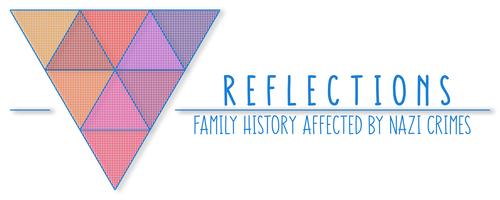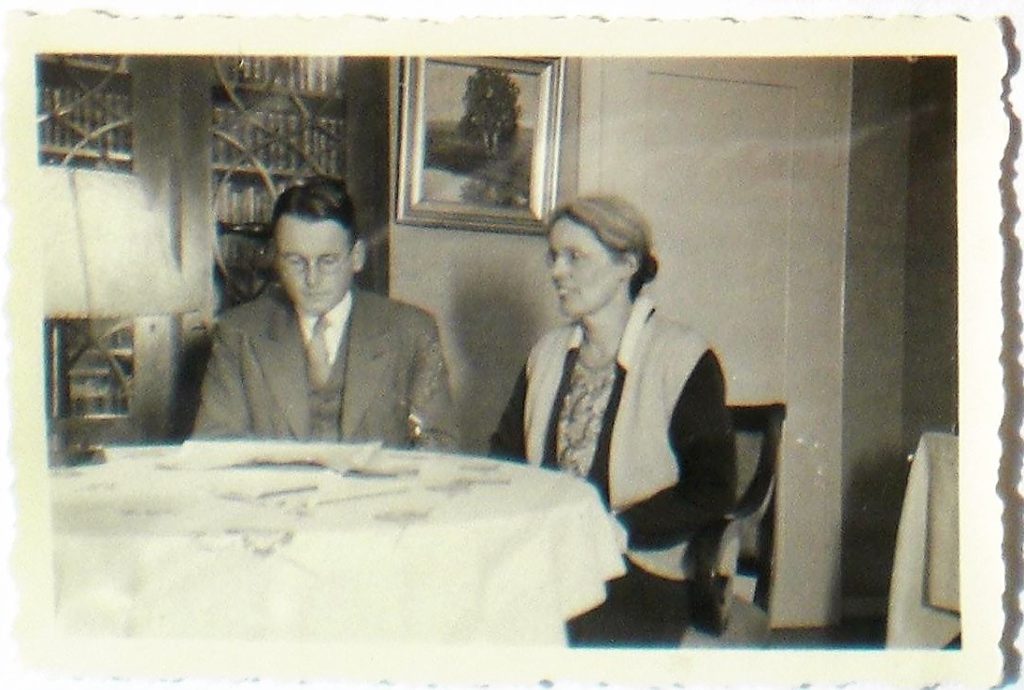
Jörg Watzinger has been following up the history of his family during the Nazi era for many years. Karl Otto Watzinger, his father, is at the centre of his research. He was persecuted as a supporter of the SAP (Socialist Workers Party) and survived Dachau concentration camp.
Karl Otto Watzinger’s concentration camp detention caused a deterioration in mental illness of his mother Marie Watzinger. She spent several years in the psychiatric department of a clinic in Göppingen, where she died shortly before the end of the war. By describing her life Jörg Watzinger also commemorates this victim of National Socialist politics.
Marie, the Goethe Admirer
Marie Watzinger, born Bollinger, was born in 1880 in Munich. She had two sisters, Else and Irma. Her father was a Professor of pathology. Marie herself didn’t train towards a career. Theatre and literature became a central part of her life.
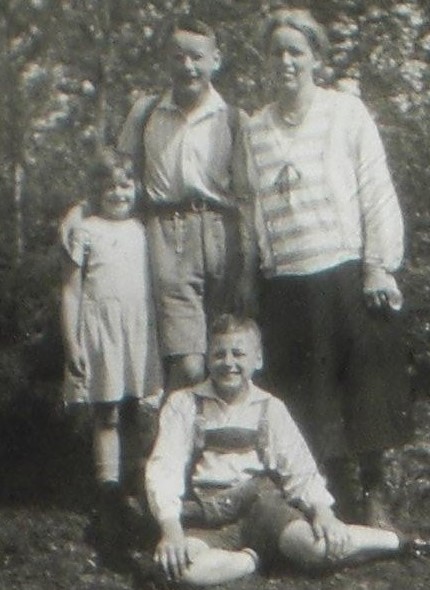
From May 1916 Carl was posted on the West front as a soldier, then from August 1916 – June 1918 given a post as an interpreter of Arabic in the Denkmalschutz command under Theodor Wiegand in Palestina. Marie brought up the two boys single-handedly for two years.
On October 1st 1918, following a professional posting of Carl to the Archeology Institute, the family moved to Tubingen. They bought a house on Osterberg, where they lived from 1933. The family spent regular holidays in Switzerland in the mountains. Her husband Carl enjoyed walking and the mountain air did her good.
In family conversations about relatives, I never managed to get a response to questions about my grandmother. I was pleased therefore, to have the letters she exchanged with Karl Otto during the two year period of his imprisonment 1939- 41, as a source to find out about her.
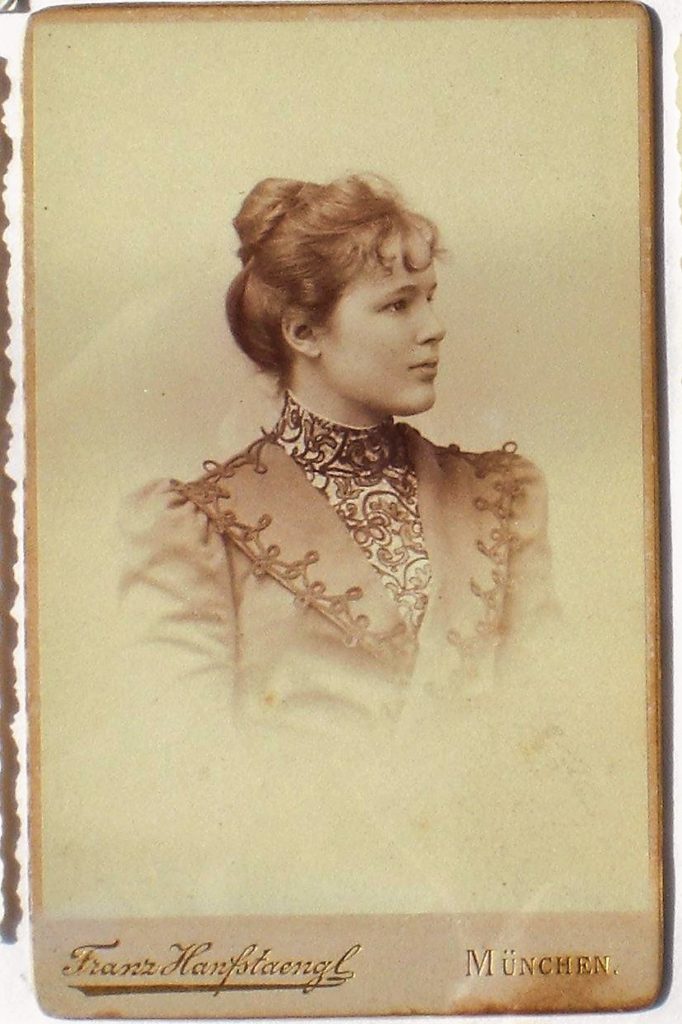
In the letters a woman comes to the fore, who is at ease with classical literature and music. With Karl Otto she embarks on an energetic exchange of ideas about literature. She can express herself well and has her own opinions about the literature she has read.
She enjoys reading authors’ published correspondence, as this tells her more about the thoughts and feelings of writers and their friends, than she would otherwise learn from the books they had written.
She has a particular love of Goethe, his poems “Poetry and Truth”, and his letters. Goethe’s correspondence with Marianne Willemer and ‘Torquato Tasso’ are among her favorites.
It was so healing to read Goethe’s poetry, they are a mixture of emotional depth, mischief, and high spirits.
She has an acute self- awareness and sense of irony.
Classical music is played in the home. She listens to Beethoven, Mozart, Haydn and Bach on the radio. She also enjoys playing piano.
The longing for her children.
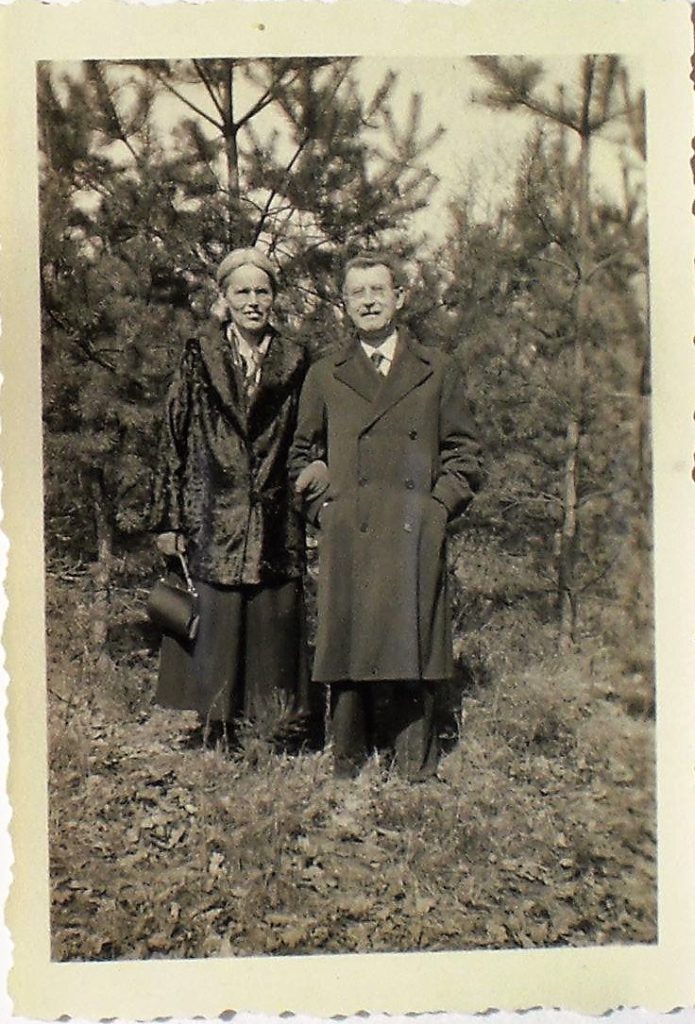
By 1939 she has already become incapacitated by her asthma. She writes about regular daily walks on the Osterberg in Tubingen, avoiding any uphill climbs. Her breathing problems mean she can no longer manage the hikes on the Alb or in Switzerland, which she could do three years previously.
From 1939, Karl Otto was under investigation in Bruchsal for 1 and a half years, and after the verdict he spent six months in a prison in Ulm. He was charged with high treason because he was accused of setting up a new organisation of the SAP (Socialist Workers Party) in southern Germany.
Up to 1940 Irmgard had been very present at home during the preparations for her Abitur (A levels). Then from April to August 1940 she has to attend a compulsory labor service. Helmut is studying in Darmstadt. Marie has dreaded this time. Later on in the letters she considers that perhaps it’s not so bad after all. Many letters, however, convey how much she misses her children. On many occasions she makes reference to Irmgard’s youthful freshness and cheerfulness.
On 25th November 1940 she celebrates her 60th birthday in Tubingen. Karl Otto sits in prison due to aiding and assisting high treason.
After his release from prison in September 1941 he spends a 3 week holiday with his parents in the Black Forest. Barely has he arrived back home, then he is removed, and taken to Dachau concentration camp.
The release from prison sees the end of the correspondence with my grandmother, Marie. Karl Otto corresponds from now on only with his father. When Marie does write it is only a few short lines.
In Dachau concentration camp visits are no longer possible. During imprisonment he had been visited by his father and brother.
What happened to Marie?
For information on the last three years of Marie’s life, I have as a source merely the correspondence of my grandfather with the clinic in Goppingen, and of Carl with his sister in law, Irma.
In addition to this, I was able to visit the clinic in Goppingen with my sister, where we could see the medical records from 1942 to 1945.
Marie’s mental illness
After Karl Otto’s deportation to Dachau concentration camp, Marie’s condition deteriorated significantly. In addition to physical incapacity due to extreme asthma, came mental difficulties.
She had difficulties with concentration. She was restless, hardly slept, talked without cease and could no longer keep the household running. The maids ran away after short time.
After a year (Autumn 1942) she was referred for the first time to psychiatric services in Goppingen.
The letters show that this decision was made after lengthy consideration of the situation. The advice of specialists was taken, for example Professor Robert Eugen Gaupp in Tubingen (editor’s note; Gaupp was already by the 1920s a promoter of what was known as ‘eugenics’).
In the clinic, Marie is diagnosed with a restless depression and a drug addiction to a stimulant asthma drug. Whilst on leave from the clinic, the family does not manage to restrict tablet consumption to the prescribed level.
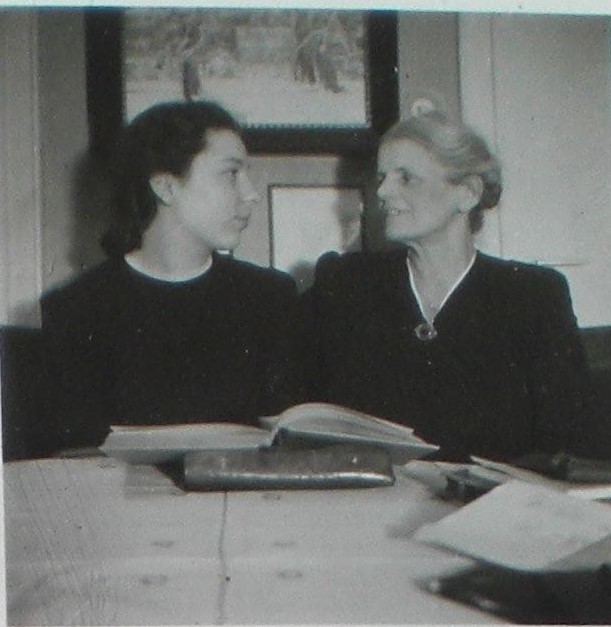
Marie’s condition deteriorates
After 2 years in the clinic, weight loss resulting from a refusal to eat, becomes a focus of medical attention. At this time, Karl Otto was drafted as a concentration camp prisoner to SS Division Dirlewanger. Irma, Marie’s sister, dies from a bombing raid in Giessen. Marie weighs only 39 kg. Bed rest is prescribed, apparently to prevent extreme restlessness when getting up.
She fell silent, blames herself to be the cause of all misfortune. In March 45 Göppingen, city of heavy industry and garrison, is bombed heavily. The patients have to move to the air-raid shelter and stay seated there for long time. In this context Marie´s breakes her leg. April 20th 1945 US Army takes Göppingen without resistance. May 4th 1945 Marie died in the clinic.
Marie is also victim of the Nazi regime.
Factors which triggered the aggravation of Marie’s condition, which led to the hospital admissions, were the arrest of Karl Otto in 1939, the beginning of the war in 1939 and, to a greater extent, the concentration camp imprisonment of Karl Otto in 1941. Psychiatry in Germany did not offer any therapy in that time. It was life-threatening to become mentally ill. „Life unworthy to live“ was separated and liqudated. 1940/41 during the T4 action 70.000 patients were taken away from psychiatric clinics and murdered in special institutions. The killing went on after the end of T4 action inside the psychiatric clinics, alltogether 300.000 people were murdered until 1945.
From the clinic Christophsbad 293 patients were taken away during T4 action, all „Staatspfleglinge“, patients whose cost the state had to pay. 182 of them were murdered evidently. Many of them died in the different institutions. 61 patients have survived the crimes of „Euthanasie“. In Christophsbad itself no patient was murdered. My grandmother was lucky to stay in a private clinic, where the doctors were not obliged to the NS „Euthanasie“-ideology. They took care to keep their patients alive, at least to keep the clinic running economically even after the loss of the „Staatspfleglinge“.
My father survived 3 years at Dachau concentration camp. My grandmother died without getting news from him and without hope to see him again. She too is a victim of Nazi persecution.
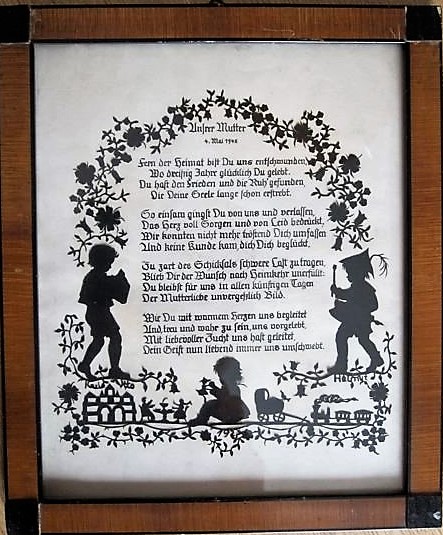
You’ve gone away, far from home.
Your happy home for thirty years.
You have found the peace and rest
For which your soul strived for so long.
You went away so solitary, and left
A heart full of worry and burdened with suffering.
We could no longer comfort and embrace you,
And there was noone who could cheer you.
Too fragile to carry destiny’s heavy burden
Your desire to come home was not fulfilled.
You will be for days to come,
An image of unforgettable motherly love.
We accompany you with warm hearts,
True and loyal you are with us,
With loving discipline you have guided us
Your spirit always surrounding us with love.
Translated by Celia McKiernan
